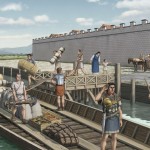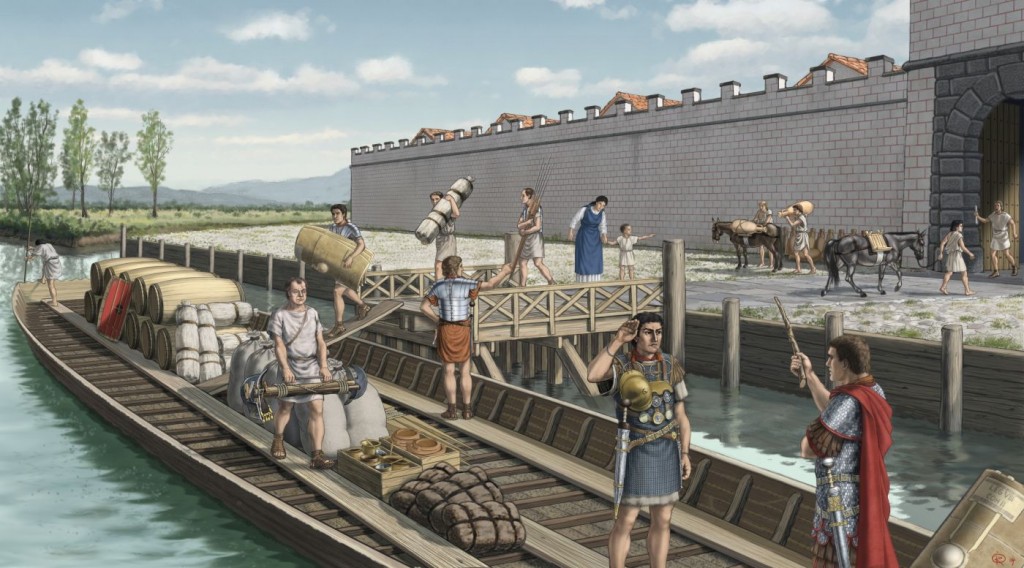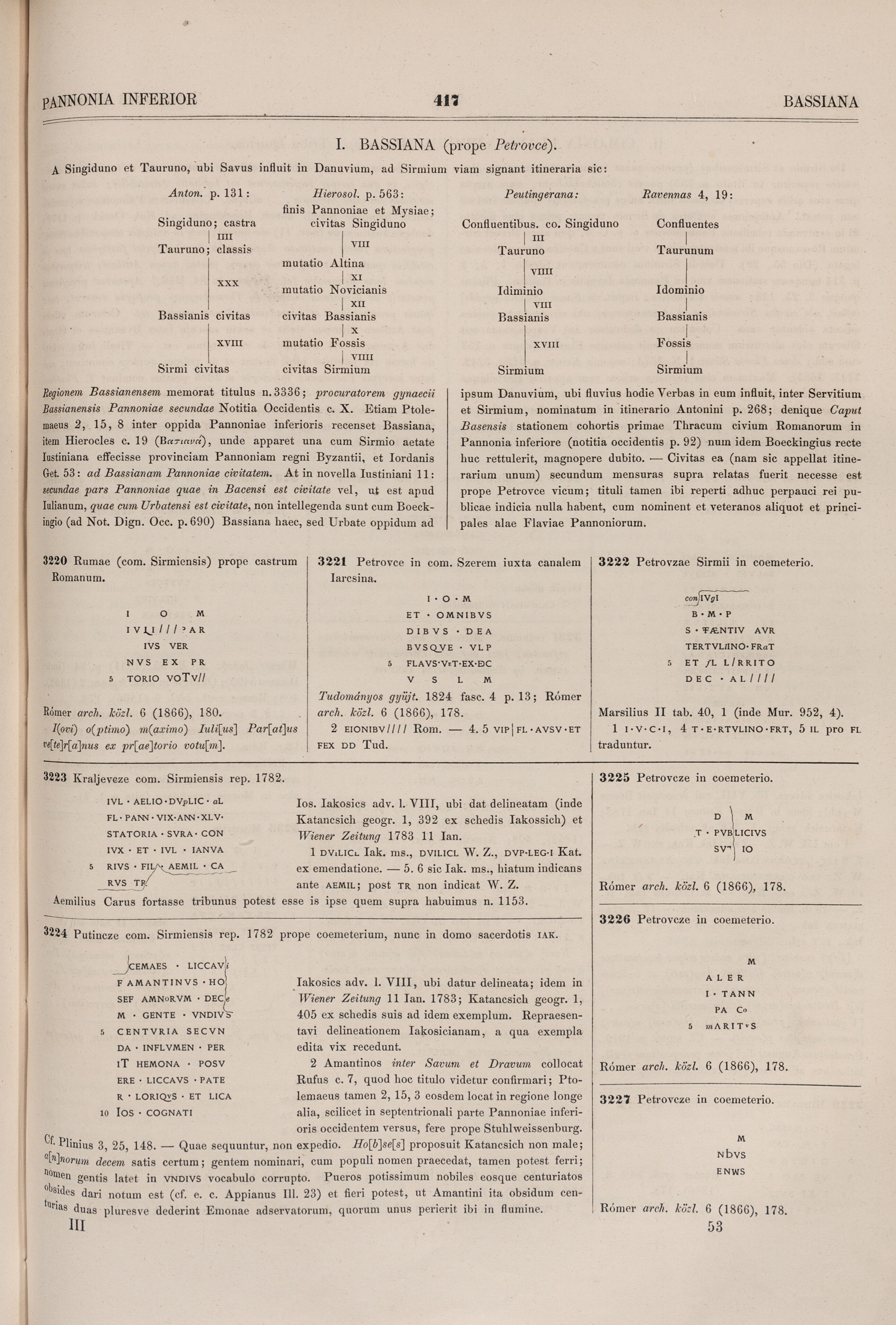It has long been believed that the river Ljubljanica had two names during Roman times. The first was ‘Nauportus’, after the settlement of the Celtic Taurisci, the pre-Roman inhabitants of these regions. This settlement would later, during the reign of Augustus and even earlier become a prominent Roman emporium in the village of Nauportus (Vrhnika). The second name of the river would have been ‘Emona’, after the town of Emona (Ljubljana), an Augustan colony.
- no response to http://gazetteer.dainst.org/search.json?q={%22bool%22:{%22must%22:%5B%20{%20%22match%22:%20{%20%22_id%22:%202359986%20}}%5D}}&type=extended!
#0 /var/www/html/eagle/wp-content/plugins/eagle-storytelling/esa_datasource.class.php(222): esa_datasource\abstract_datasource->_fetch_external_data('http://gazettee...') #1 /var/www/html/eagle/wp-content/plugins/eagle-storytelling/esa_datasource.class.php(207): esa_datasource\abstract_datasource->_generic_api_call('http://gazettee...') #2 /var/www/html/eagle/wp-content/plugins/eagle-storytelling/esa_item.class.php(142): esa_datasource\abstract_datasource->get('2359986') #3 /var/www/html/eagle/wp-content/plugins/eagle-storytelling/esa_item.class.php(63): esa_item->_generator() #4 /var/www/html/eagle/wp-content/plugins/eagle-storytelling/eagle-storytelling.php(703): esa_item->html(true) #5 /var/www/html/eagle/wp-includes/shortcodes.php(433): esa_shortcode(Array, '', 'esa') #6 [internal function]: do_shortcode_tag(Array) #7 /var/www/html/eagle/wp-includes/shortcodes.php(273): preg_replace_callback('/\\[(\\[?)(captio...', 'do_shortcode_ta...', 'It has long ...') #8 /var/www/html/eagle/wp-includes/class-wp-hook.php(324): do_shortcode('
It has long ...') #9 /var/www/html/eagle/wp-includes/plugin.php(205): WP_Hook->apply_filters('
It has long ...', Array) #10 /var/www/html/eagle/wp-includes/post-template.php(256): apply_filters('the_content', 'It has long bee...') #11 /var/www/html/eagle/wp-content/plugins/eagle-storytelling-bridge/template/loop-single-story.php(38): the_content() #12 /var/www/html/eagle/wp-content/plugins/eagle-storytelling-bridge/template/single-story.php(9): include('/var/www/html/e...') #13 /var/www/html/eagle/wp-includes/template-loader.php(106): include('/var/www/html/e...') #14 /var/www/html/eagle/wp-blog-header.php(19): require_once('/var/www/html/e...') #15 /var/www/html/eagle/index.php(17): require('/var/www/html/e...') #16 {main}
The river Nauportus is mentioned by Pliny the Elder (the author of the first Roman encyclopedia, in the 1st century AD), when he describes how Jason and his Argonauts navigated along the rivers Danubius, Savus and the Nauportus as they were returning with Medeia and the golden fleece from Colchis on the Black Sea to Greece. Eventually they had to stop in the village of Nauportus, since no river flows from this place to the Adriatic, from where they hoped to reach Jason’s native Thessaly.
The river name Emona seems to have appeared on a now-lost cenotaph for a ten-year-old Amantine boy found at the distant village of Putinci in Moesia (Serbia), where the people of the Amantini once lived. The unfortunate ‘Scemaes’ (whose name may actually have been ‘Scenas’, if the inscription was not copied carefully) drowned as a hostage in the Ljubljanica, no doubt during the period of the great conquest of the Balkans conducted during the reign of the emperor Augustus by his adopted son Tiberius in the last decade BC.
A military tactic of the commanders of the Roman army at the time was to take the children of tribal leaders and distinguished families as hostages. The Romans had to provide suitable living conditions for a great number of such children, obviously in towns that were safely under Roman control, preferably in Italy, and, if possible, not too far from the regions at war.
The taking of hostages is well illustrated by the Greek historian Appian of Alexandria (2nd century AD) when describing how Octavian (as Augustus was called before 27 BC) arrived in Pannonian Segesta (also called Siscia, present-day Sisak in Croatia) during the Illyrian War (35–33 BC), in order to station a garrison there and use it as a base against the dangerous Dacians and Bastarnae. Octavian demanded and received a hundred hostages, and also asked for as much food as the inhabitants of Segesta could supply. Appian recounts that:
Before that, Octavian attacked Metulum, the capital of the Iapodes (near Ogulin in Croatia), and demanded that the residents of Metulum deliver fifty hostages to him. However, they decided not to surrender. Instead, they offered desperate resistance and eventually all perished in flames, women and children included. The Delmatae, the Octavian’s last enemies in the war, had to deliver several hundred children as hostages after their defeat, together with the military standards seized from Gabinius, the commander of Caesar, in the previous war in Dalmatia in 48 BC.
- Trismegistos-Id: 404168
- honorand: unknown
- debug: Curl error: (22) The requested URL returned error: 503 Service Unavailable | http://epidoc.dainst.org/
- Material: unknown
- Artifact Type: inscription
- Type: unknown
- conservationPlace: Donji Petrovci44.962457 19.978176
- findingSpotAncient: Donji Petrovci - Bassianae , Pannonia inferior
- findingSpotModern: Donji Petrovci
- entityType: artifact
- Repository: Epigraphische Datenbank Clauss - Slaby
The inscription on the cenotaph of the Amantine boy is unfortunately preserved only in a manuscript, since the stone itself is lost. It supposedly read: “He died in the river Emona” (in flumen perit Emona). However, it was almost certainly incorrectly copied and the mentioned name of Emona likely referred to the town and not the river. The text should in fact read: ‘he died in the river in Emona’. There were possibly two hundred or more hostages in Emona, if the ‘second centuria, a unit of 100’ mentioned in the inscription, refers to their number, which seems highly likely.
The hostage Scemaes, who had been brought to Emona during one of the wars in Pannonia, must have belonged to one of the most prominent families of his tribe; otherwise, his father Liccavus and two of his close relatives, Loriq(u)us and Licaios, would not have erected an expensive cenotaph to him. What happened to the poor child can only be guessed. Perhaps he fell in the river while disembarking from a ship and nobody noticed in time that he was missing, or perhaps he drowned while attempting to flee.



